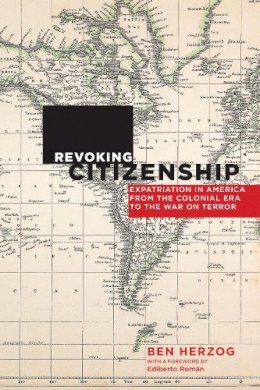
Revoking Citizenship
Ben Herzog
Reveals America’s long history of making both naturalized immigrants and native-born citizens un-American after stripping away their citizenship
Expatriation, or the stripping away citizenship and all the rights that come with it, is usually associated with despotic and totalitarian regimes. The imagery of mass expulsion of once integral members of the community is associated with civil wars, ethnic cleansing, the Holocaust, or other oppressive historical events. Yet these practices are not just a product of undemocratic events or extreme situations, but are standard clauses within the legal systems of most democratic states, including the United States. Witness, for example, Yaser Esam Hamdi, captured in Afghanistan in November 2001, sent to Guantánamo, transferred to a naval brig in South Carolina when it was revealed that he was a U.S. citizen, and held there without trial until 2004, when the Justice Department released Hamdi to Saudi Arabia without charge on the condition that he renounce his U.S. citizenship.
Hamdi’s story may be the best known expatriation story in recent memory, but in Revoking Citizenship, Ben Herzog reveals America’s long history of making both naturalized immigrants and native-born citizens un-American after their citizenship was stripped away. Tracing this history from the early republic through the Cold War, Herzog locates the sociological, political, legal, and historic meanings of revoking citizenship. Why, when, and with what justification do states take away citizenship from their subjects? Should loyalty be judged according to birthplace or actions? Using the history and policies of revoking citizenship as a lens, Revoking Citizenship examines, describes, and analyzes the complex relationships between citizenship, immigration, and national identity.
Product Details
About Ben Herzog
Reviews for Revoking Citizenship
Pnina Lahav,Boston University "In this pioneering study, Ben Herzog shows that in order to understand the continually-contested status of citizenship, we must understand how citizenship is lost. Challenging the popular notion that only totalitarian regimes take away citizenship, his book throws much needed light on the long history of revocation in the United States, the postwar judicial revolution that minimized the practice, and new challenges in the twenty-first century to that revolutions achievements. By deftly placing contemporary controversies about terrorism and the right to have rights into this broader historical and social context, Revoking Citizenship provides a timely yet sure to be lasting contribution to scholarship. For anyone concerned with the problems of citizenship, it is essential reading."
Chad Alan Goldberg,University of Wisconsin-Madison "Scholarship on citizenship has awakened to the potential power that lies in laws of expatriation. Ben Herzogs political, philosophical, and jurisprudential history of expatriation practices reaches back further in U.S. history than other such studies and sheds much needed light on the contemporary relevance of this important facet of U.S. citizenship."
Elizabeth F. Cohen,Syracuse University "ThatRevoking Citizenshipnot only provokesquestions but also simultaneously provides the groundwork necessary for further inquiry into these issues illustrates why the book is likely to become a staple in the canon of historical and legal scholarship on citizenship."
The Journal of American History
"For Herzog, expatriation policy and practices are windows to American understanding of citizenship."
Choice
